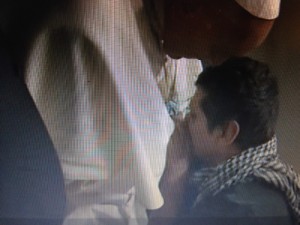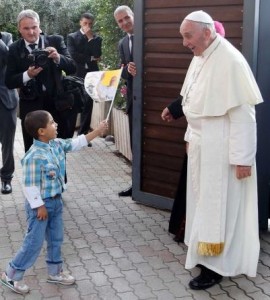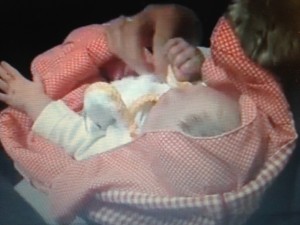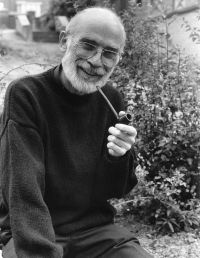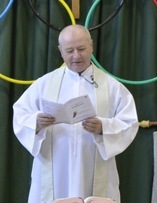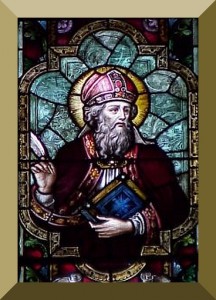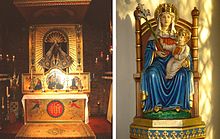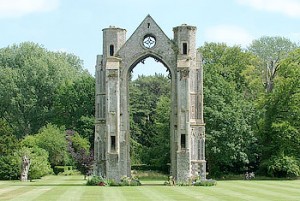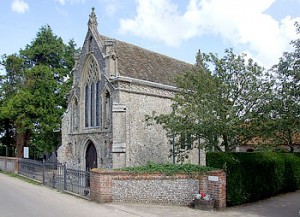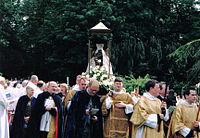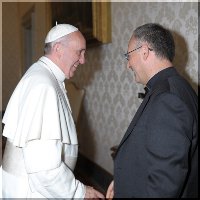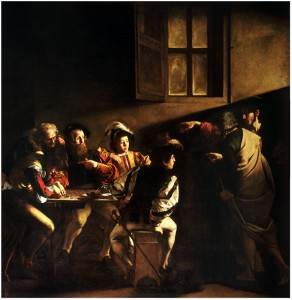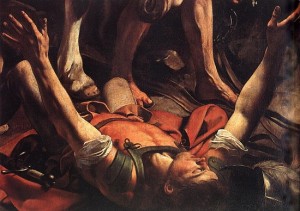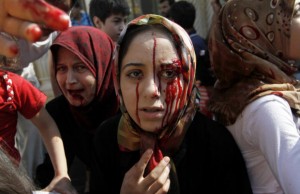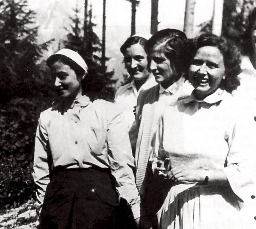Almost 2,000 years ago, circa the years, 33 – 36 AD, a ‘climactic event took place on the road to Damascus. A certain man, then named Saul, who was one of many who took to themselves to exact persecution on the fledgling Christian communities, happened to be travelling towards the city when he became involved in what can only described as a life-changing experience. All of a sudden, he was rendered sightless by a ray of light that came down from the heavens. It is said that he fell to the ground and it was then that he heard a voice speaking to him:
“Saul, Saul, why do you persecute me?”
The Conversion of Saul
Apart from having officiated at the martyrdom by stoning of the first martyr, St. Stephen, Saul was an ardent hater of the followers of Jesus, and before beginning his journey to Damascus, he had been to see the High Priest and had asked for letters of authority, empowering him to arrest Christians, and bring them bound to Jerusalem:
“But Saul, still breathing threats and murder against the disciples of the Lord, went to the high priest and asked him for letters to the synagogues at Damascus, so that if he found any belonging to the Way, men or women, he might bring them bound to Jerusalem.”
The ‘voice’ then told Saul to get up and to go into Damascus, when he would be given further instructions. Saul’s companions took him to Damascus where he remained sightless for three days, neither eating nor drinking. Now in the city there was a disciple called Ananias and the Lord appeared to him, told him about Saul, and where he was. Ananias was told to go to Saul and to lay his hands on him in order that he may be cured. And so it came to pass – Saul was cured of his blindness by the laying-on of hands. After this, he was baptised under the new name of Paul, and he became a disciple of Jesus – the one who would take the Good News to the Gentiles.
From all of this, the conversion of St. Paul, we then have the truth that Paul became one of Jesus’ greatest disciples, one who endured many sufferings and later a martyr’s death in order to bring God’s word to the many peoples of foreign lands – to those who had never heard of Jesus – and, in so doing, he began the international evangelisation of peoples, then and since – a movement that eventually spread to the whole world. Think of the importance of St. Paul – his position in the grand scheme of Christianity, yesterday and today; think of his letters to the Corinthians, the Colossians, Romans …. the list goes on and on. Almost half of the books in the New Testament have been attributed to him. Think of the importance of what he had to say – think of his words of wisdom on all sorts of matters that still affect our everyday lives – our relationships with God and with the Word of God. His influence on Christian thought and practice has long been characterised as being ‘as profound as it is pervasive’ – an influence that is just as strong today as it ever was.
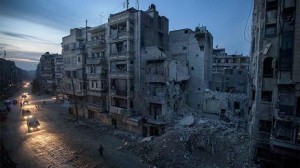 |
Today’s Ruined Cities of Syria
But, there is another quite different ‘Road to Damascus’, we hear of in 2013, and this for quite different reasons – most of which are concerned with a bitter civil war that has been raging for a couple of years and more – a war in which hundreds of thousands of people have been killed. The majority of these dead are just ordinary humble and poor people, trying to live their lives in a kind of ‘hell’, and they include a huge number of young children, infants and youths. On top of this, millions of the ordinary Syrian population have lost their homes, the majority having been reduced to rubble by heavy artillery, rockets and other types of ordnance; to all of this must be added the millions that have fled their homeland and become refugees in neighbouring countries such as Turkey, Kurdish Iraq, Jordan, and the Lebanon.
Victims of Chemical Attacks in Damascus
In the last month, not content with hitting our headlines on virtually every daily news bulletin, for the reasons given in the last paragraph, Syria – and Damascus in particular – has been in our news for quite a different reason. It has been reported that, on the 21 August, many hundreds of men, women and children were either seriously injured, or killed, by the indiscriminate use of chemical weapons on the city’s population. The allegations are that the country’s ‘president’ – in Syria’s case, a word that is synonymous with ‘dictator’ – was responsible for the use of such internationally condemned weapons on a section of his own people, and this has given way to international abhorrence, condemnation and calls for the use of armaments by western forces: 1) to show the president and his generals that he cannot escape detection in the use of such prohibited weaponry, 2) to punish him and his government forces in some way – a punitive action – for the use of them, essentially, and 3) to dissuade him and his forces from ever using such weapons again in the future.
Not surprisingly, the United Nations Security Council permanent members, USA, UK, France – at odds with Russia and China – also with other western governments have been debating the issues, vehemently; many have been arguing for the use of military force against Syria; opposed to such action, many have been saying that the western powers should not get involved. The British Government has decided not to become involved, militarily, and the US President has decided that he is going to refer the whole question to Congress. For the moment, therefore, no punitive military actions are being planned, and many governments, authorities and peoples are thankful for this input of what they see as common sense – as opposed to the ‘knee jerk’ reactions that were being advocated by the military ‘hawks’, always ready to put forward their ‘act now, pay later’ approach.
At this stage, I can almost hear you ask the question just what is this blog all about? What has St. Paul and his conversion on the road to Damascus got to do with the Damascus of today? And the answer, I think, is that there is a significant connection – a connection that has to do with the power of evil.
St. Paul was engaged in what he later came to acknowledge as a resolve to ‘put down’, to destroy, the early movement towards Christianity; he was prepared to use any means to that end – even murder. He referred to himself as a “Hebrew born of Hebrews” at Tarsus, and his vocation at the time was to protect the only way of life he knew – very much a ‘right wing’ Jewish way. Later, having come to know Jesus, he admitted that his actions had been wrong, that he deserved to be punished for those actions by God, and that he did not deserve to be redeemed and go to heaven. But, true sorrow and reconciliation with God, and His Word, can go a long way – they worked wonders for St. Paul, and, small wonder it is today, then, that Paul is regarded as one of the greatest of the saints and martyrs.
That was then, 33 to 36 AD, and the power of evil was at work. Bring the whole picture up to date and we have the same influences at work, once again. Civil war, in itself, is a great evil, and so is the victimisation of a population – of one’s own people. The use of air power and of all kinds of weaponry against a mostly unarmed population is analogous to such evil; fighting on both sides – official and rebellious – cannot bring forth good, and the use of indiscriminate methods of mass murder – extermination almost – has the ‘stink of badness’ about it. Similarly, the use of external force, by foreign countries, not involved in the civil conflict, can cause great harm – and always with the possibility of cataclysmic consequences for the whole region.
It seems to me that, after all the advances that have been made in human knowledge – despite the experience of centuries of living ‘side by side’, individually, socially, nationally and internationally, we still cannot resolve our differences peacefully. Peacefully, is God’s way! Fighting is our way – most of the time. Man, what are we to do with man? Perhaps we could do no better than to go back to St. Paul and his letter on the value of love. His words, describing what love is, are just about the most touching, the most gentle, the most beautiful, I have ever read on the subject. Were we to adopt them – even a little more than we presently do – then human society could at least give itself a ‘pat on the back’, for once; just think how many lives might be saved, just think of the added sums of money we would then be able to spend on looking after the poor, the starving, the sick and the downtrodden, of human populations across the world, as an alternative option to the buying of armaments and the maintenance of armed forces.
When, when, when are we going to learn the lesson?
Socius
Father Jonathan adds a very important rider to the above:
“Rule in Syria has always been tyrannical, but it was never a country growing up, organically, like England; essentially, it was a territory imposed fairly recently on diverse peoples,.
My own view is that this Syrian crisis, with all the evil, the smell of the devil inside it, is affecting the hearts of millions and millions all over the world. It is a very dangerous situation – a ‘powder keg’ of emotions, if you like.
My clear impression is that there is good and bad on both sides in this civil war. There are many factions in the mix. The majority of Christians remaining in Syria are on the side of the Government. Amongst the ‘freedom fighters’ or rebel ‘opposition’ to government forces are many shades of fundamentalism, and the fear is that they will take over if they can; they are manipulative and unable to see the others’ points of view, whether religious, or of the ‘Al Quaida’ persuasion; there are many other varieties besides. In the mix is the pride of politicians, and trying to ‘save face’ on all sides.
I do not wish to be too simplistic, but all this amounts, as I say to a very dangerous situation; this may be the price being paid with the loss of so many poor, innocent lives, in order that the good of the future can emerge – through untold suffering. It is like Jesus dying on the cross again, and again, and again, all the while feeling abandoned by God.
In putting forward these comments, I need to be careful of quick judgements about what is going on in Syria. The same has been true over events in Iraq and Afghanistan. What a world!!
However, I loved the BBC Correspondent Jeremy Bowen’s report, when a man on the Government side said yesterday: “We from Syria have given you St. Paul, (as is portrayed so well in the blog, above); you have given us terrorists!”
This also may be a little too simplistic, but he has a point.”
Last Saturday night, we in Leyland, joined with millions around the world to pray at a ‘last minute request’ from Pope Francis; there were thousands in St. Peter’s Square, with the Pope, concomitant with our small congregation in our own Blessed Sacrament Chapel. But God has listened to our prayers, because the proposed strikes into Syria have been delayed. Consequent on – and subsequent to – the Russian intervention offering to monitor, on behalf of the international community, the control and surrender of Syria’s chemical weapons, Syria’s President has said he will agree to the bringing of all such weapons under international control. Let us at last hope that these initiatives are given the chance to succeed, and thus steer the world away from further conflagration.
